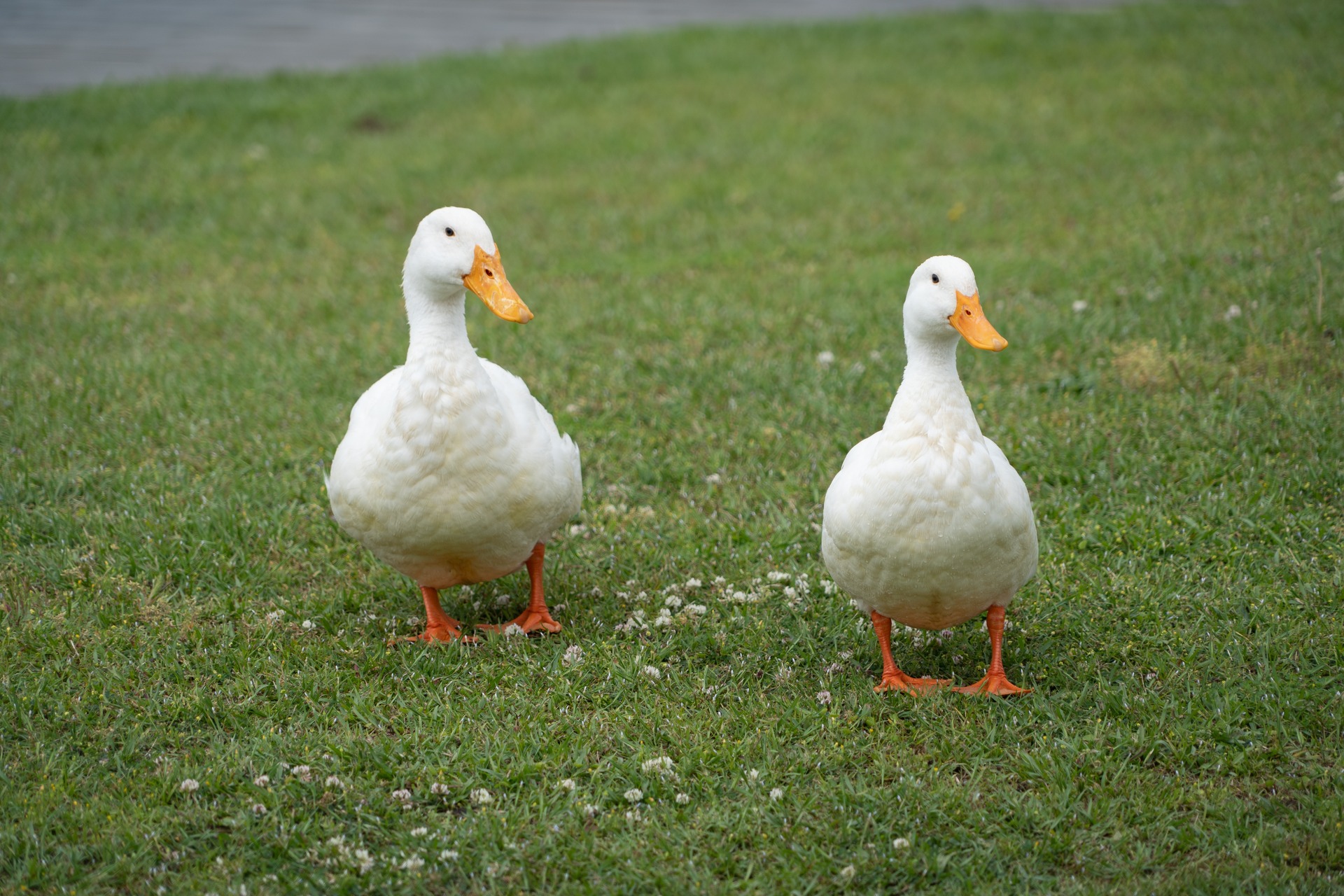
What Are the Benefits of Keeping Ducks?
We are reader-supported. When you buy through links on our site, we may earn affiliate commission.
Whether you’re new to homesteading or you’ve been living sustainably for years, pets and livestock are common sights on homesteads. Ducks are one of the unsung heroes of the homestead barnyard. Learn more about the benefits of ducks and the many reasons to keep them on your property.
10 Benefits of Ducks on Your Homestead
From more nutritious meals and a clean lawn to fewer pests and a calming atmosphere, there are several reasons to keep ducks. Check out ten of the top benefits below.
1. Eggs
Just like chickens, ducks produce eggs, which is one of the primary reasons many homesteaders keep these birds. Duck eggs are a super healthy option for any meal. Their nutritional value largely depends on your duck’s diet and the types of feed you give them, but they’re often high in necessary minerals and vitamins.
Many people prefer the taste of duck eggs. They’re typically creamier and richer than other fowl eggs. Depending on the duck breed and their living conditions, ducks can produce eggs all year round.
2. Lawn Maintenance
Speaking of a duck’s diet, you can rely on these waterfowl to help clean up your lawn by eating unwanted weeds, seeds, roots, and grass. If you have garden plots strewn with debris from last year’s crop, set your ducks loose and they’ll have it spick and span in no time so you can prepare for this season’s planting.
Ducks roaming your property will also trim the grass with their healthy appetites, including eliminating tasty weeds like dandelions.
3. Pest Control
A duck’s appetite extends past fruits and vegetables. These omnivores eagerly chow down on any bugs and insects on your property. Ducks are a great organic pest control method on the homestead, eating slugs, worms, beetles, crickets, grasshoppers, and other insects prowling your garden.
While chickens also help take care of pests, ducks are more easily managed and won’t cause as much damage to your soil.
4. Fertilizer
All that eating leads to even more benefits for your homestead. Thanks to their healthy and diverse diets, duck manure is high in nutrients and makes an excellent fertilizer for your plants and crops.
Ducks tend to poop wherever they go, which is good news for your sustainable farming practices. These birds naturally fertilize the grass where they wander or you can gather manure from their pen to spread it where you need it. Since ducks spend much of their time in ponds, you can even gather that water in a watering can to fertilize plants.
5. Duck Meat
If you plan on raising fowl to eat, ducks are a tasty choice. While chickens are white meat, ducks are considered red meat, more like beef or pork. They offer more protein, fat, and iron — plus, it has a rich, juicy flavor that appeals to many palates.
Make sure you select the right duck breed if you’re raising them for meat. Heavier breeds like Pekins and Muscovy are large and provide more meat per duck.
6. Feathers
Like geese, ducks have feathers that are perfect for creating warm liners, pillows, and more. Down feathers are the layer closest to the duck’s skin and provide the softest feel. However, gathering duck feathers can be a complicated process. It also takes several birds to make a single pillowcase, so do your research before deciding to use your ducks for their feathers.
7. Intelligent
Ducks are remarkably smart animals. Ducklings imprint just hours after hatching, forming emotional and intelligent bonds with their caregivers. Throughout their lives, ducks enjoy playing, socializing, performing tricks, and understanding their surroundings.
Having these intelligent animals around your homestead can liven up the property.
8. Friendly With Other Animals
As social animals, ducks enjoy being around other ducks. They need other waterfowl around to stay stimulated and avoid loneliness.
In addition to their own species, ducks are compatible with other animals you might find around the homestead. As long as their needs are met, they get along with chickens and geese. Ducks can even protect chickens from mice and other vermin that attack chicks or their eggs.
9. Nice Atmosphere
Ducks’ natural intelligence, sociability, and friendly personalities make them a welcome addition to any property. If raised around humans, they can be cuddly and entertaining as you herd them from one place to another. Ducks are safe to have around kids — they’re less likely to nip or scratch than chickens.
With ducks on the homestead, you’ll get to enjoy their familiar quacks as they swim around their pond every day. Nothing makes a property feel like home as much as happy critters waddling across your lawn.
10. Low-Cost
Ducks are among the most affordable livestock you can raise on your homestead. If they’re free-range birds, they forage the bulk of their own food while eating bugs, grass, and weeds on our property, cleaning up the land while saving you money on feed.
While you need to make some initial investments to start raising ducks, such as pens, they’ll pay off quickly. Ducks bring so much to your homestead, you’ll be glad you put in the effort to make them at home on your property.
Tips for Keeping Ducks
You can’t obtain the advantages of keeping ducks if they aren’t happy and healthy. What are the best ways to keep them this way?
If you’re interested in raising ducks, keep these tips in mind to make the most of your new waterfowl pets.
Provide Enough Water
You’ll need a water feature on your property for ducks to thrive, like a pond or similar wading pool. The water should be deep enough to be comfortable, but it should also be spacious to give them room to float as they please without feeling crowded.
You can also spread around water tubs and trays around their domain if you don’t have enough natural water sources. This gives them more places to cool off and bathe.
They also need water to help them eat. The moistness helps them swallow without fear of choking.
Look Out for Predators
While ducks are willing to fight off smaller vermin like mice and weasels, they can’t defend themselves from bigger predators like foxes. You’ll need to provide safe shelter for them at night. Predator-proof pens are the way to go. These are tall fences that are strong enough to withstand the teeth of chewing predators.
You can also incorporate technology to help monitoring. Having cameras and sensors that send alerts to your devices is a great peace of mind. Many connect to your phone, so you can check on the pen whenever you want.
Know How to Prepare for Ducklings
Have appropriate expectations for how ducklings appear and how frequently. It takes a little less than a month for them to hatch. When they come out, you might be distracted by how cute they are.
However, they will require you to execute more maintenance and oversight over your numbers. They can make more of a mess than the adults.
Don’t Compare Ducks to Chickens
If you’re new to raising birds, just keep in mind ducks and chickens are very different. They both produce eggs and require similar needs, but viewing ducks with a chicken mentality will set you up for disaster. Their behaviors vary drastically, and it may limit your care. You may not learn as much about them and their unique habits, ailments, and communication styles if you let any knowledge of chickens sway you.
Keep an Eye out for Worms
It’s not the most pleasing subject to read about, but worms harm poultry all the time. It’s essential to provide your animals regular health care and checkups, but inspecting and testing for worms regularly is also crucial. They could have:
- Tapeworms
- Gapeworms
- Roundworms
- Gizzard worms
- Caecal worms
Know the signs of strange behavior that could indicate a duck is sick. Weight loss, coughing, and affected mobility are a few signs.
Steer Clear of Bread
While feeding ducks breadcrumbs may be a popular trope in movies, you should avoid giving your ducks bread. It lacks the proper nutrition and can even damage a duck’s digestive system, leading to fatal complications and deformities.
Instead, focus on a more balanced diet. Grain and feed with protein will facilitate that. Ducks can enjoy rice, corn, and insects, among other things.
The Many Benefits of Ducks on Homesteads
From eggs and meat to freshly-trimmed lawns and nutrient-rich fertilizer, ducks can bring endless benefits to your homestead. Decide if these friendly waterfowl are right for you and enjoy their cuddly, quacking presence for years to come.
This was updated May 24, 2024, with more updated information.
Share on
Like what you read? Join other Environment.co readers!
Get the latest updates on our planet by subscribing to the Environment.co newsletter!
About the author
Maria Visser
Maria serves as the Assistant Editor of Environment.co. A true foodie and activist at heart, she loves covering topics ranging from veganism to off grid living.





